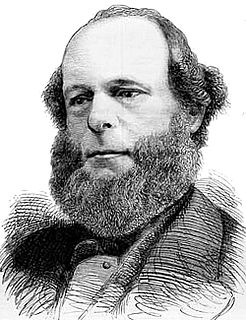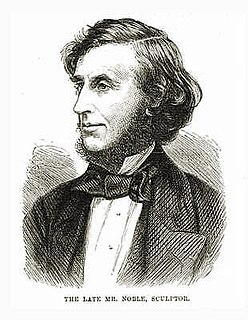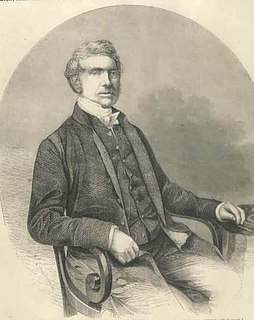Henry Badham Thornhill was an Anglican priest, most notably the first Archdeacon of Perth, WA. [1]
On his return from Australia he served at Eatington, [2] and Henley in Arden. [3] He died on 2 March 1874. [4]
Henry Badham Thornhill was an Anglican priest, most notably the first Archdeacon of Perth, WA. [1]
On his return from Australia he served at Eatington, [2] and Henley in Arden. [3] He died on 2 March 1874. [4]

John Winston Spencer-Churchill, 7th Duke of Marlborough, styled Earl of Sunderland from 1822 to 1840 and Marquess of Blandford from 1840 to 1857, was a British Conservative cabinet minister, politician, peer, and nobleman. He was the paternal grandfather of Prime Minister Sir Winston Churchill.

John Somerset Pakington, 1st Baron Hampton,, known as Sir John Pakington, Bt, from 1846 to 1874, was a British Conservative politician.

James Hamilton, 1st Duke of Abercorn,, styled Viscount Hamilton from 1814 to 1818 and The Marquess of Abercorn from 1818 to 1868, was a British Conservative statesman who twice served as Lord Lieutenant of Ireland.

Richard Plantagenet Campbell Temple-Nugent-Brydges-Chandos-Grenville, 3rd Duke of Buckingham and Chandos, styled Earl Temple until 1839 and Marquess of Chandos from 1839 to 1861, was a British soldier, politician and administrator of the 19th century. He was a close friend and subordinate of Benjamin Disraeli and served as the Secretary of State for the Colonies from 1867 to 1868 and Governor of Madras from 1875 to 1880.

Lord Robert Montagu PC was a British Conservative politician. He served as Vice-President of the Committee on Education between 1867 and 1868.

Sir James Fergusson, 6th Baronet was a British soldier, Conservative politician and colonial administrator.

Richard Congreve was the first English philosopher to openly espouse the Religion of Humanity, the godless form of religious humanism that was introduced by Auguste Comte, as a distinct form of positivism. Congreve was the first thinker to offer a systematic policy, on positivist lines, to dismantle the British Empire. In 1859, after issuing controversial anti-imperialist pamphlets on Gibraltar and India, he delivered his 'first sermon' as a Positivist apostle and 'vicar' of the Religion of Humanity. He later founded the London Positivist Society in 1867 and, after a schism with his closest followers in 1878, he broke off to formally found the Comtist Church of Humanity.

Algernon George Percy, 6th Duke of Northumberland,, styled Lord Lovaine between 1830 and 1865 and Earl Percy between 1865 and 1867, was a British Conservative politician. He held office under the Earl of Derby as Paymaster-General and Vice-President of the Board of Trade in 1859 and under Benjamin Disraeli as Lord Privy Seal between 1878 and 1880.

Henry Charles FitzRoy Somerset, 8th Duke of Beaufort KG, PC, DL, styled Earl of Glamorgan until 1835 and Marquess of Worcester from 1835 to 1853, was a British peer, soldier, and Conservative Party politician. He served as Master of the Horse between 1858 and 1859 and again between 1866 and 1868.

Matthew Noble was a leading British portrait sculptor. Carver of numerous monumental figures and busts including work memorializing Victorian era royalty and statesmen displayed in locations such as Westminster Abbey, St. Paul's Cathedral and in Parliament Square, London.
John Camden Hotten was an English bibliophile and publisher. He is best known for his clandestine publishing of numerous erotic and pornographic titles.

John Fielder Mackarness was a Church of England bishop.

Sir Stephen Cave was a British lawyer, writer and Conservative politician. He notably served as Paymaster-General between 1866 and 1868 and again between 1874 and 1880 and as Judge Advocate General between 1874 and 1875.

Sir William Milbourne James, was a Welsh barrister and judge. A Chancery specialist, he was appointed to the Court of Chancery of England in 1869. The next year, he was appointed Lord Justice of Appeal in Chancery, serving until his death in 1771.

Kilburn railway station was a railway station which served the village of Kilburn in Derbyshire, England. It was opened in 1856 by the Midland Railway on its Ripley branch from Little Eaton Junction to Ripley.
The Ven John Russell Walker , MA was an eminent Anglican priest in the last third of the 19th century.
Foster Grey Blackburne, MA was Archdeacon of Manchester from 1905 until his death.

Robert Mosley Master, also known as the “Clogging Parson”, was Archdeacon of Manchester, England. from 1854 to 1867.
Hugh Usher Tighe was a Dean of the Church of England.
Charles Rogers (1825–1890) was a 19th-century Scottish minister and prolific author. In the second half of his life, he repeatedly ran into trouble for setting up publication societies from which he gained financial benefit.